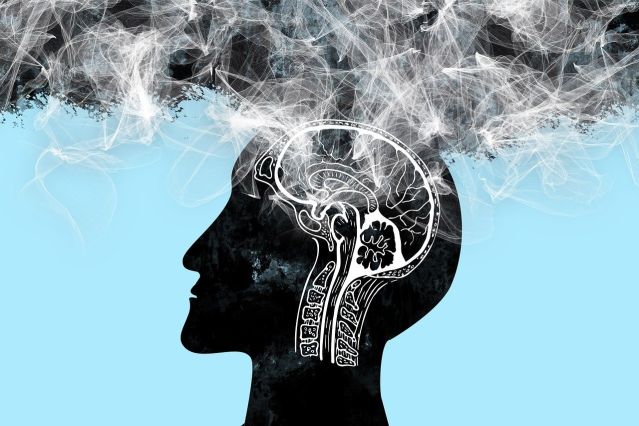Dementia
When Reality Is Fractured
Understanding moral injury in people experiencing dementia.
Updated June 20, 2023 Reviewed by Abigail Fagan
Key points
- Moral injury is distress that occurs when one behaves in a way that contradicts their moral beliefs.
- Cognitive issues in dementia can exacerbate moral injury because of the fluctuations in cognitive functioning.
- Eliminating stigma and misconceptions around dementia is key for diagnosis and support.

This post was co-authored with Latisha Fernandez.
Two years after her stroke, one of us, Latisha, suddenly felt overwhelming guilt and shame because she thought she killed her dad. Thankfully her mother was able to reassure her that she was not to blame. Her father had complications after a bone marrow transplant and he had an advance health directive that required the termination of life support. Latisha was diagnosed with mild cognitive impairment and aphasia after her stroke. Due to her limited ability to communicate, and her family not being educated about what this meant for her daily life, they were completely unprepared for the memory loss, personality changes, emotional distress and confabulation caused by her brain damage.
Latisha didn’t remember all of the details about her father’s death, but she felt all of the emotions of grief and guilt like it was yesterday. Her brain tried to make sense of why she was feeling guilty and filled in the gaps with irrational conclusions. She was reliving the moral injury she felt 15 years earlier. She was fortunate to have documents that confirmed what happened and an established relationship with a therapist to resolve the distress she was feeling, but many people with cognitive impairment do not get this resolution and their loved ones don’t know how to console them. Latisha’s situation is not unique. In 2020, there were more than 55 million people living with dementia, and this number will increase exponentially, yet 75% are undiagnosed. Many, like Latisha, are under the age of 65.
What is Moral Injury?
Moral injury is a psychological and emotional response that occurs when an individual perceives themselves to be responsible for actions that go against their deeply held moral beliefs. Few have heard of moral injury and how it affects the psychological well-being of an individual. Yet everyone will experience or will know someone experiencing this common human condition at some point. Someone experiencing moral injury may feel guilt, anger, shame, anxiety, or depression and they will often isolate themselves from others. It is not uncommon for there to also be issues with sleep disturbances, substance abuse, a loss of self-control, PTSD, or suicidal ideation. Moral injury has a significant impact on work and relationships because one of the consequences of moral injury is shame or lack of trust in others.
In the past moral injury was thought to only be related to military trauma, but recent research advances in neuroscience, and increased awareness of trauma surrounding first responders and COVID-19, make it clear that moral injury can affect anyone. An individual’s moral compass is fluid and can change in nuanced or extreme ways as they grow older based on the interaction between self-identity, life experiences, and societal expectations. For example, a woman who felt her best option was to have an abortion when she was 15 years old may not experience moral injury until she is a successful, married, 30-year-old holding her newborn baby in a time when society has a lot of stigma around abortion. However, she may again feel like the abortion was the right thing to do when she is 40 struggling to pay the bills as a single mother after a divorce and in a society that is more accepting of abortion. With the societal changes that have happened over the last 65 years regarding civil rights and scientific, technological, and medical advances, it is probable that adults have experienced multiple extreme shifts in their moral identity.
Moral Injury in Dementia
The complications of moral injury in people with dementia have been a concern in palliative care for military veterans for many years due to anecdotal evidence, but there is limited scientific research in this area. New discoveries and theories in cognitive psychology have shown us that the human brain has many unconscious thought processes that shape our experience of reality. The brain constructs reality based on prior knowledge, perspective, and past experiences. We see different colors or sounds in optical illusions and auditory illusions based on how we perceive the context of the situation. When a person has dementia, these thought processes, sensory perceptions, and emotional connections are fractured so they experience reality differently. Dementia can exacerbate moral injury because of fluctuations in cognitive functioning and memory loss. For example, a man who was raised in a time when segregation was enforced but now has a daughter-in-law of a different race who he thinks of as his own daughter may have difficulties reconciling this contradiction when key aspects of his identity formation and the societal changes can’t be retrieved from memory.
Stigma Is the Problem, Not the Person
There are things that we can do as a society to help. First, we need to eliminate stigma about dementia and seeking treatment for mental health. Understanding that cognitive impairment and moral injury can happen at any age and that it will impact everyone differently can also help to remove the stigma.
Second, bringing awareness to the symptoms of dementia and moral injury will help people to identify when professional help may be needed. The misconception that Alzheimer’s is the only type of dementia means that other types of dementia like Lewy body, frontal-temporal, and vascular dementia go undiagnosed. Getting a diagnosis early is very important for the quality of life of people living with all types of dementia, but it is particularly important for dementia that is due to reversible causes like thyroid imbalance or vitamin deficiency. In addition to memory issues, dementia symptoms include:
- Problems with communication
- Emotional changes
- Energy fluctuations
- Issues with attention
- Loss of inhibition
- Errors in judgment
- Hallucinations, paranoia, or nightmares
- Sudden issues with time management and planning
- Fluctuations in physical and cognitive abilities
It is important to remember that people experiencing dementia will have good days where everything seems normal, but there will also be times when they are unable to control their thoughts and behaviors, and they may not be able to adapt to the world around them. Cognitive issues can be very confusing and disturbing, but what they are experiencing has a foundation in reality and their emotional experience is valid based on their perception at that moment in time.
Using treatments for moral injury like talking about it with others and receiving empathetic reassurance can be helpful. Research has also shown that writing, peer group therapy, and religious or meditation rituals can be effective, but these methods may be more difficult for people with dementia. More research is needed to find effective treatments for moral injury in people with dementia.
Dignity And Wellbeing
As Brene Brown says, “If you put shame in a Petri dish and douse it with empathy, it can’t survive.” Moral Injury means that someone is a vulnerable, self-reflective human being who is thinking about how they impacted the world. This is not a bad thing; morality is a cognitive tool for growth and human decency. Listening, empathizing, and relating to their humanity regardless of their cognitive ability is the moral thing to do. It is our responsibility as a society to accommodate and adjust to help support the dignity and well-being of people experiencing dementia. With the right support, people experiencing dementia and moral injury can continue to live happy and fulfilling lives for many years after diagnosis. Improving the quality of life for people with dementia improves the quality of life for everyone.
Latisha Fernandez is an alum of Dr. Bogart’s Psychology of Disability class at OSU and is continuing her education at Johns Hopkins Bloomberg School of Public Health.




